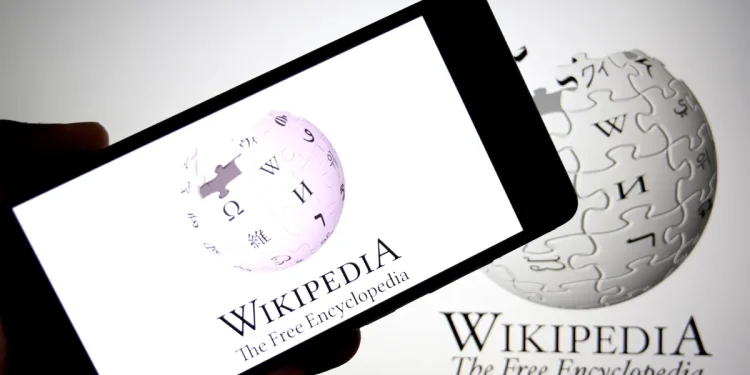The world’s most trusted encyclopedia just sounded an alarm that could change how we think about information on the internet. Wikipedia’s traffic dropped 8% in recent months as people turn to AI-powered search summaries instead of visiting the actual source.
Marshall Miller from the Wikimedia Foundation revealed this sharp decline in a blog post that exposed a troubling trend that sophisticated bots are getting better at mimicking human behavior while scraping Wikipedia’s content to power AI chatbots and search engines.
AI Bots Are Getting Smarter at Staying Hidden
Wikipedia discovered something unsettling when they updated their bot detection systems in May 2025. Much of what appeared to be human traffic from Brazil was actually advanced bots designed to evade detection.
“Many bots that scrape websites like ours are continually getting more sophisticated and trying to appear human,” Miller explained. These aren’t your typical crawlers, they’re engineered to slip past security measures and harvest content without being caught.
The foundation had to reclassify months of traffic data, revealing that bot activity was significantly higher than initially thought. This discovery prompted them to strengthen their detection methods, but it also exposed how AI companies are becoming more aggressive in their data collection tactics.
Search Engines Now Answer Instead of Directing
Google and other search engines provide direct answers through AI summaries, often pulling information straight from Wikipedia without users ever clicking through to the source.
When Google displays AI summaries at the top of search results, users click on links to other websites only 8% of the time, nearly half as often as when no AI summary appears.
This means millions of searches that once drove traffic to Wikipedia now end at the search results page. Users get their answers without ever seeing where the information originated.
Young People Skip Websites Entirely
Younger generations are turning to social video platforms like TikTok and YouTube for information instead of traditional websites.
Miller noted that “younger generations are seeking information on social video platforms rather than the open web.” This lays a fundamental shift in how people consume knowledge, from text-based sources to video content that’s easier to digest and share.
Wikipedia’s content still reaches these audiences, but indirectly. Social media creators often reference Wikipedia information in their videos without directing viewers to the source.
The Hidden Cost of Free Information
Wikipedia’s content powers much of the AI-generated information people see online, but fewer people know where it comes from.
“Almost all large language models train on Wikipedia datasets,” Miller pointed out. ChatGPT, Google’s AI summaries, and social media fact-checks all rely heavily on Wikipedia’s carefully curated information.
Yet as direct visits decline, so does the volunteer army that creates and maintains this content. Wikipedia depends on engaged users who notice errors, add new information, and donate money to keep the site running.
With fewer eyes on the actual Wikipedia pages, fewer people are likely to contribute or support the platform financially. This creates a dangerous cycle where the source of reliable information weakens even as demand for that information grows.
Google Disputes the Impact Claims
Google pushes back against claims that AI summaries hurt website traffic. The company argues that AI features actually increase user satisfaction and can lead to more searches overall.
However, multiple studies paint a different picture. Research covering over 300,000 keywords shows that AI Overviews can cut click-through rates by 34.5% for top-ranking pages. Some websites report traffic drops of 20% to 40% since AI summaries became widespread.
The disconnect between Google’s claims and real-world data highlights the complex relationship between AI tools and web traffic. While users might be happier getting quick answers, content creators face significant challenges maintaining their audiences.
News Publishers Feel the Same Squeeze
News organizations and other content publishers report similar traffic declines as AI summaries satisfy user queries without requiring clicks.
The Guardian found that sites previously ranked first in search results can lose up to 79% of their traffic when AI summaries appear above them. This “devastating drop” affects how news organizations fund their operations and reach their audiences.
Major media companies, including The New York Times and Bloomberg, have joined forces to address how AI companies use their content. Some are pursuing legal action, while others negotiate licensing deals.
Wikipedia’s Fight for Survival
The Wikimedia Foundation is taking several steps to address these challenges:
- Enforcing stricter bot policies to prevent unauthorized scraping while working with legitimate AI companies on proper attribution systems.
- Creating new reader teams focused on bringing fresh approaches to how people discover and engage with Wikipedia content.
- Experimenting with new platforms like YouTube, TikTok, and Instagram to reach younger audiences where they already spend time.
- Developing mobile editing tools to make it easier for people to contribute content from their phones.
The foundation also launched “Future Audiences” experiments, creating Wikipedia content in new formats like videos and games to engage users who prefer interactive experiences.
What’s Next for Online Information
Wikipedia’s traffic decline explains how information flows online. As AI tools become the primary interface between users and knowledge, the original sources risk becoming invisible.
This creates several risks:
- People may not understand where their information comes from, making it harder to evaluate credibility.
- Content creators and fact-checkers receive less recognition and support for their work.
- The quality of information could decline if fewer people contribute to and maintain original sources.
Wikipedia explicitly calls on AI companies to “encourage more visitors to Wikipedia” so that the knowledge ecosystem remains sustainable.
The Battle for Attribution
The foundation is developing new frameworks for attribution, ensuring that AI companies properly credit Wikipedia when using its content. This goes beyond simple citations, it involves creating systems that encourage users to visit and support the original sources.
Some AI companies are already collaborating on these efforts, recognizing that their long-term success depends on maintaining healthy information sources. Others continue aggressive scraping practices that strain Wikipedia’s infrastructure.
The outcome of these negotiations will likely determine whether collaborative knowledge projects like Wikipedia can thrive in an AI-dominated internet.
A Call for Digital Citizenship
Miller urged internet users to take more responsibility for supporting quality information sources. He recommends:
- Looking for citations when reading AI-generated content and clicking through to original sources.
- Talking to friends and family about the importance of human-curated knowledge.
- Understanding that AI content depends on real people who deserve support for their work.
- Supporting platforms like Wikipedia through donations or volunteer contributions.
These actions might seem small, but they’re essential for maintaining the information ecosystem that powers everything from AI chatbots to social media fact-checks.
The Future of Free Knowledge
Despite the challenges, Wikipedia remains optimistic about its future. The platform continues to be highly trusted globally, and its content reaches more people than ever before, even if they don’t directly visit the website.
The foundation is experimenting with new ways to engage users while staying true to its mission of providing free, accurate, human-created knowledge. Success will depend on finding the right balance between embracing new technologies and maintaining the community-driven model that made Wikipedia successful.
As Miller concluded: “Our vision is for a future where everyone can participate in knowledge creation and sharing – a future that is possible when everyone uses the free knowledge ecosystem responsibly.”
The next few years will determine whether that vision survives the AI revolution or becomes another casualty of technological disruption.
















